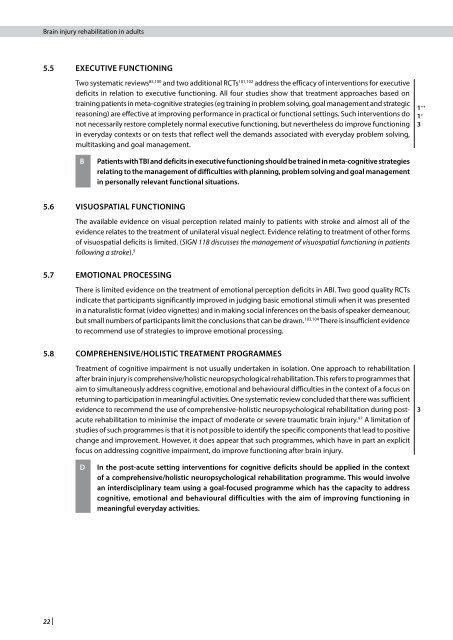sign130
sign130
sign130
You also want an ePaper? Increase the reach of your titles
YUMPU automatically turns print PDFs into web optimized ePapers that Google loves.
Brain injury rehabilitation in adults<br />
5.5 ExECuTIVE fuNCTIoNING<br />
22 |<br />
Two systematic reviews 85,100 and two additional RCTs 101,102 address the efficacy of interventions for executive<br />
deficits in relation to executive functioning. All four studies show that treatment approaches based on<br />
training patients in meta-cognitive strategies (eg training in problem solving, goal management and strategic<br />
reasoning) are effective at improving performance in practical or functional settings. Such interventions do<br />
not necessarily restore completely normal executive functioning, but nevertheless do improve functioning<br />
in everyday contexts or on tests that reflect well the demands associated with everyday problem solving,<br />
multitasking and goal management.<br />
B Patients with TBI and deficits in executive functioning should be trained in meta-cognitive strategies<br />
relating to the management of difficulties with planning, problem solving and goal management<br />
in personally relevant functional situations.<br />
5.6 VISuoSPATIAl fuNCTIoNING<br />
The available evidence on visual perception related mainly to patients with stroke and almost all of the<br />
evidence relates to the treatment of unilateral visual neglect. Evidence relating to treatment of other forms<br />
of visuospatial deficits is limited. (SIGN 118 discusses the management of visuospatial functioning in patients<br />
following a stroke). 5<br />
5.7 EMoTIoNAl PRoCESSING<br />
There is limited evidence on the treatment of emotional perception deficits in ABI. Two good quality RCTs<br />
indicate that participants significantly improved in judging basic emotional stimuli when it was presented<br />
in a naturalistic format (video vignettes) and in making social inferences on the basis of speaker demeanour,<br />
but small numbers of participants limit the conclusions that can be drawn. 103,104 There is insufficient evidence<br />
to recommend use of strategies to improve emotional processing.<br />
5.8 CoMPREHENSIVE/HolISTIC TREATMENT PRoGRAMMES<br />
Treatment of cognitive impairment is not usually undertaken in isolation. One approach to rehabilitation<br />
after brain injury is comprehensive/holistic neuropsychological rehabilitation. This refers to programmes that<br />
aim to simultaneously address cognitive, emotional and behavioural difficulties in the context of a focus on<br />
returning to participation in meaningful activities. One systematic review concluded that there was sufficient<br />
evidence to recommend the use of comprehensive-holistic neuropsychological rehabilitation during postacute<br />
rehabilitation to minimise the impact of moderate or severe traumatic brain injury. 97 A limitation of<br />
studies of such programmes is that it is not possible to identify the specific components that lead to positive<br />
change and improvement. However, it does appear that such programmes, which have in part an explicit<br />
focus on addressing cognitive impairment, do improve functioning after brain injury.<br />
D In the post-acute setting interventions for cognitive deficits should be applied in the context<br />
of a comprehensive/holistic neuropsychological rehabilitation programme. This would involve<br />
an interdisciplinary team using a goal-focused programme which has the capacity to address<br />
cognitive, emotional and behavioural difficulties with the aim of improving functioning in<br />
meaningful everyday activities.<br />
1 ++<br />
1 +<br />
3<br />
3


